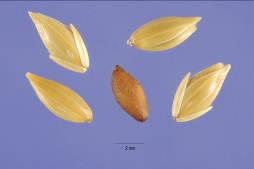EMBARGOED FOR RELEASE
ACS News Service Weekly PressPac: June 19, 2013
New canary seed is ideal for gluten-free diets in celiac disease
“Analysis of Glabrous Canary Seeds by ELISA, Mass Spectrometry and Western Blotting for the Absence of Cross-reactivity with Major Plant Food Allergens”
Journal of Agricultural and Food Chemistry
A new variety of canary seeds bred specifically for human consumption qualifies as a gluten-free cereal that would be ideal for people with celiac disease (CD), scientists have confirmed in a study published in ACS’ Journal of Agricultural and Food Chemistry.
Joyce Irene Boye and colleagues point out that at least 3 million people in the United States alone have CD. They develop gastrointestinal and other symptoms from eating wheat, barley, rye and other grains that contain gluten-related proteins. Boye’s team sought to expand dietary options for CD — which now include non-gluten-containing cereals like corn, rice, teff, quinoa, millet, buckwheat and sorghum.
They describe research on a new variety of “hairless,” or glabrous, canary seed, which lacks the tiny hairs of the seed traditionally produced as food for caged birds. Those hairs made canary seed inedible for humans. It verified that canary seed is gluten-free. Boye also noted that canary seeds have more protein than other common cereals, are rich in other nutrients and are suitable for making flour that can be used in bread, cookies, cakes and other products.
The authors acknowledge funding from the Canaryseed Development Commission of Saskatchewan.
Contact
Science Inquiries: Michael Woods, Editor, 202-872-6293
General Inquiries: Michael Bernstein, 202-872-6042


